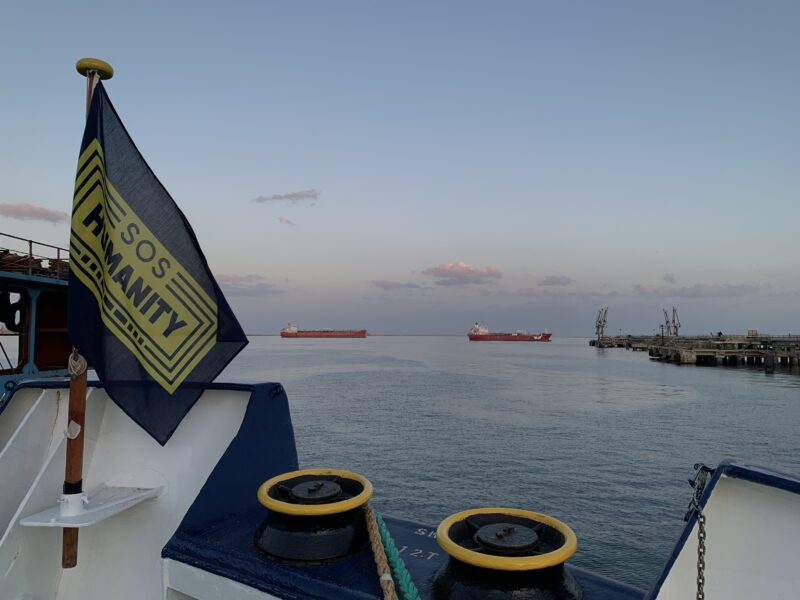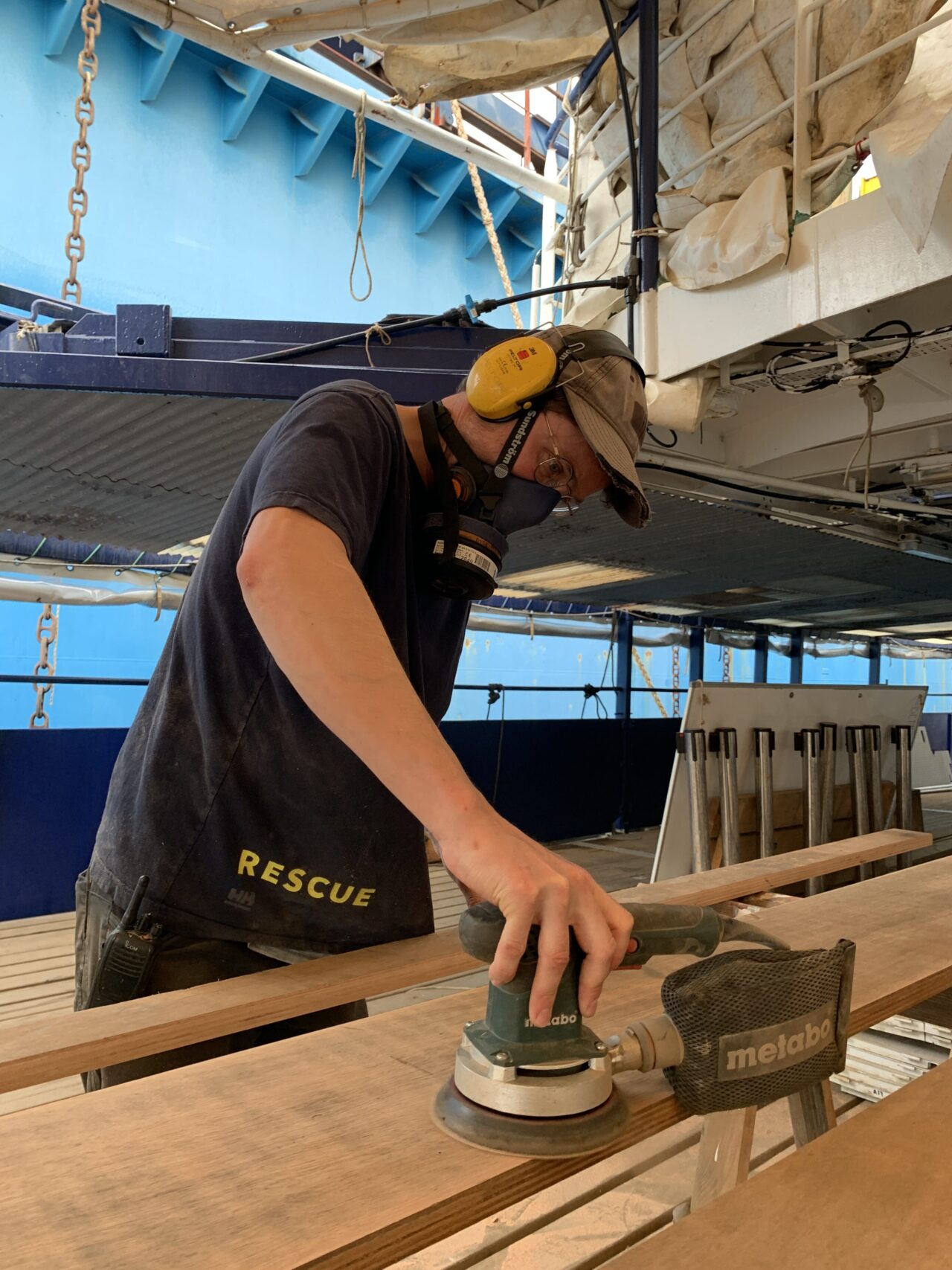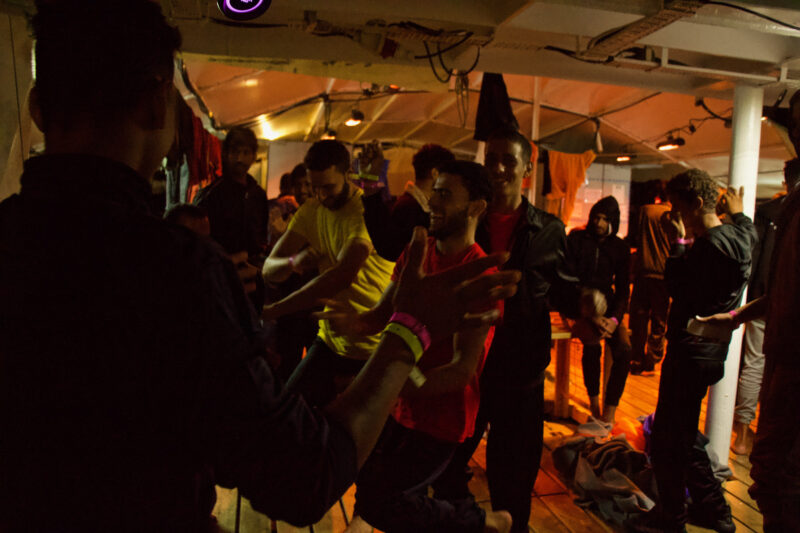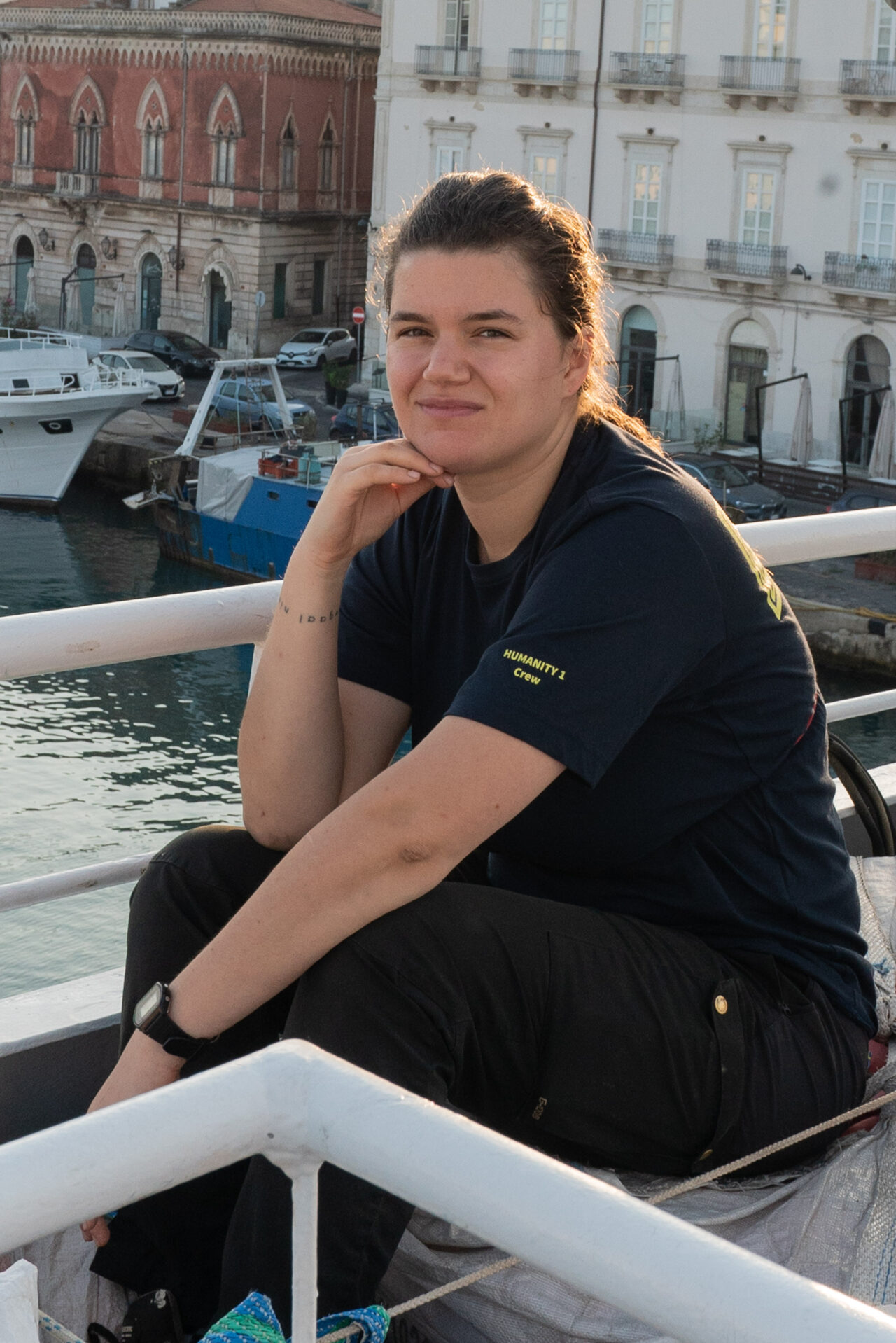Knowing what you are there for: Dora, Paul and Martin on their volunteer work on board the Humanity 1

Dora, Paul and Martin are currently helping with the shipyard work in Augusta as volunteers. Paul and Martin are both carpenters and are helping with the woodwork. Both have already helped with previous shipyard work on board the Humanity 1. Dora is helping our chef Tine in the galley and, unlike Paul and Martin, has already been on a search and rescue mission on the Humanity 1.
What are currently your tasks on board the Humanity 1?
Paul: At the moment, I’m making small pieces of furniture for the bridge and replacing a few parts. I’m also working on the boat deck. The wooden deck has been raised so that rust protection measures can be carried out. We have to lower it again afterwards, but in such a way that the panels can be removed to facilitate further maintenance work on the steel structure, such as rust knocking. Then you don’t have to dismantle the entire structure for cleaning, as we did in the last shipyard in Burriana.
Martin: The next project is the small lounge area for the crew, which needs a bench and more storage space. The floor there also needs to be redone, it will get new fold-up elements to make it easier to clear certain areas. Apart from that, I’ve been working on the crane and adjusting the new bolts, as they were simply far too long.
What makes the work difficult is that there is little material available, and you have to work with leftovers. On the ship, it is not possible to make a quick trip to the hardware store and pick up everything you need. Money is always tight here.
What is your personal motivation for working on board the Humanity 1?
Dora: For me, there are two aspects: One is that I am working politically with an organisation whose goals I support. Being part of something is really great. And then the second aspect is more personal. I feel very comfortable in this crew. I like being here and the atmosphere on board is great, the people are great.

Paul: It’s about doing something and trying to improve the situation in the Mediterranean. People are dying at sea because they are trying to escape from desperate situations. So, the motivation is obvious.
Martin: You hear so much, you see so much on TV but when you experience it for yourself, you realise that help is really urgently needed. I went on a mission with a search and rescue organisation at the beginning of 2018 and that was intense. Over the years, I’ve been with several organisations, wherever I’ve been needed.
Where does your interest in civil search and rescue come from?
Dora: Before I joined SOS Humanity, I had never been actively involved in search and rescue. However, I have always heard about it and been in favour of it because you see in this world how people are divided. Some people have the right to go anywhere, they have the right passport, they can go anywhere, and other people can’t. They have to take these dangerous journeys just to find somewhere else to live and that’s just unfair.
The lives of those fleeing are worth just as much as everyone else’s.
Paul: I don’t really have an interest in civil search and rescue. I have more of an interest in helping.
Was there any special experience you made on board?
Dora: What surprised me, for example, was that on the eighth search and rescue mission I was on board, we rescued 50 people who were on an overcrowded boat. They had been at sea for a very long time. When they boarded our ship, many people needed help walking, they were completely exhausted and dehydrated. And then, a few days later, on the last night before the disembarkation, everyone was happy and relieved that they could finally go ashore, and everyone was dancing and playing music. It was just great to see this huge difference in just three days, and at that moment you realise that we really took good care of them, and I’m proud to be a part of it.

I like to cook for them and help them to have a moment of peace alongside the good food. Because sometimes they haven’t had a hot meal for ages. That’s my way of looking after them.
At that moment, it doesn’t matter where you come from, what you’ve been through or who you are, you just sit together and eat.
Paul: I think it’s just the diversity of the people I’ve met. The motivations and backgrounds of others are exciting and it’s fascinating to see how much people give up helping other people – that’s the best experience of all.
I see how people deal with it when they come back from their search and rescue missions. The other day someone told me that the so-called Libyan Coast Guard shot into the sea when people were in the water because they fell off the boat.
Martin: What I find really nice is that despite all the work, sometimes under difficult conditions and after a long day, you can still see smiling faces and that everyone knows what they are here for. We do it to rescue lives.

What are your wishes or political demands regarding the situation in the Central Mediterranean and migration policies?
Dora: The most important demand I have are safe and legal refugee routes. But the new migration law that has just been passed is going in the wrong direction. It means more externalisation, processes such as the asylum procedure are being made more difficult and people are being sent back more quickly – without a chance of appeal.
It’s bad to see that Europe is building ever higher walls.
Paul: I guess everyone has the feeling that the way the world works is that you try to stick a plaster on a problem. And that’s how it works, from the smallest to the biggest problems.
And then it’s about tackling the problem at source through education, investment in communities and societies. Capitalism is a good starting point, the system needs to change.
Martin: It’s absolutely terrible that there is currently no ray of hope at the political level and that things have only got worse over the years. The fact that the so-called Libyan Coast Guard is still being supported, especially by the Italian government, but also the further militarisation of Frontex or the tightening of laws is simply terrible. The approach is becoming more and more aggressive, making it even more difficult to carry out rescue missions.


